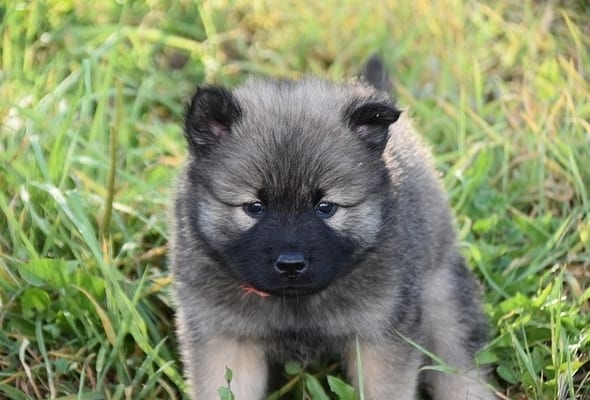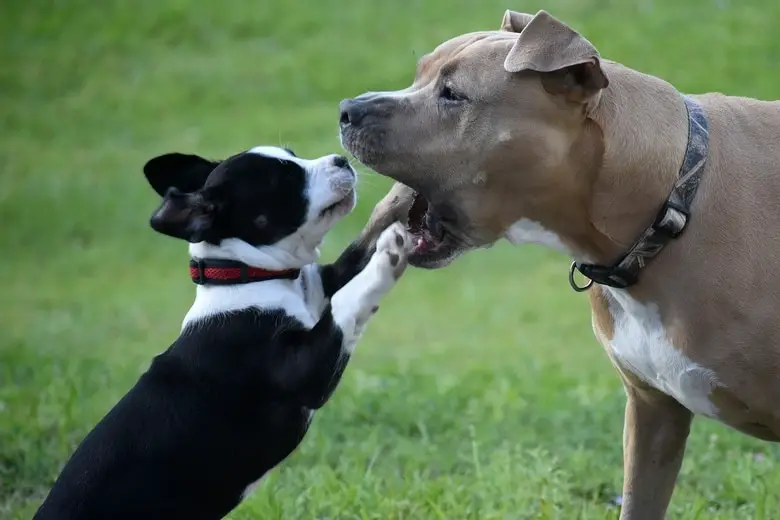When caring for a puppy, you always want to make sure that they are in the safest environment possible. That being said, you may be wondering: When can a puppy be around other dogs?
Don’t worry, we will explain the answer as well as some other helpful information about puppies and their required vaccinations.
When Can a Puppy Be Around Other Dogs?
A puppy can be around other dogs when they are fully vaccinated. A puppy will receive its last set of vaccinations at about 16 weeks of age, but that could vary depending on what age you brought your puppy to the veterinarian for its first set of shots.
Your puppy will need to have received rabies, bordetella, lepto, and 2 of the combination vaccines before being allowed around any area that other dogs are in.
This means that you should never, ever bring your unvaccinated puppy to any pet stores, dog parks, regular parks, or on any walk that other dogs traffic as well.
The best way to ensure safety in your puppy’s health and wellness is by bringing them into a veterinary clinic after you have taken over their ownership.
Can Vaccinated Puppies Be Around Unvaccinated Dogs?
Puppies should never be allowed around any unvaccinated dog, no matter the vaccination status of the puppy. Parvo is a highly contagious and deadly disease that puppies are at an increased risk for, and can pass the virus on to other vaccinated pets.
If you are planning on bringing a puppy into your home that already has a dog living there, it is best to ensure that the housemate is completely up to date on all vaccines before bringing the puppy home. This verifies the safety of not only the puppy but your other dog as well.
Parvo is extremely contagious to puppies no matter their vaccination status because they have weak immune systems that take time to develop.
Parvo isn’t the only sickness that puppies (even vaccinated ones) can get from other dogs, so always ensure the proper vaccination status of any dog before allowing your puppy around them.
We strongly advise you to research and learn more about what sicknesses are common for dogs in your area.
What Are the Benefits of Vaccinating My Puppy?
As mentioned before, puppies need to be properly vaccinated because of the weak immune systems they are born with that make them more susceptible to animal-borne illnesses.

Your puppy can contract illnesses from more animals than just their own species, and there is an increased risk for certain illnesses depending on the region you reside in. It is important to establish a relationship with a local veterinarian who will be able to educate you on region-specific care.
Keeping your puppy up to date on their vaccines throughout their life also helps to build a strong immune system, which is important in your puppy’s overall ability to live a long, healthy, and happy life.
Some states and locations may have specific companion animal vaccines that are required by law, so it is important to check your local pet regulations to ensure you properly meet them.
How Will Vaccinations Affect My Puppy?
Vaccines can affect pets just like they affect humans! It is completely normal for the injection site to be tender, and your puppy may seem a little more lethargic than normal, and some may even develop a low-grade fever.

Your pup should be back to normal a day or two after their vaccine, and some puppies may not even seem to be affected by it at all. If your puppy begins to vomit, have diarrhea, or pant, you need to seek emergency veterinary care to ensure they are not having a severe allergic reaction.
We recommend waiting at the veterinary office for 15-20 minutes after your pup has been vaccinated to ensure that there will be no serious reactions. However, if you notice the injection site swelling, reddening, and beginning to ooze, this could be an allergic reaction that requires veterinary care.
Some dog breeds are predisposed to vaccine allergic reactions, so it is important to bring your pup into a veterinary clinic for their vaccines. Not to worry, if your puppy is allergic to any vaccine, there are pre-medications that veterinary clinics offer that can reduce the risk of a reaction a good bit.
It is also fairly normal for a dog to have loose bowel movements after any stressful event, so be on the lookout for that.
How Can I Comfort My Dog After Their Shots?
Some puppies may not even be affected by a vaccine, but if your pup is, there are multiple ways of comforting them after their shots. The easiest way to do this is by making sure your puppy has a warm, comfy area to rest in where they feel safe and relaxed.
You should also have food and water readily available for them, but try not to be surprised if they aren’t all that interested, as they may just not feel like eating or drinking at the moment. If your puppy goes longer than a full day with no eating and drinking, we recommend seeking veterinary care.
Keep in mind that the injection site can be tender, so your puppy may not appreciate any overt affection like pets and cuddles.
Your puppy should be right back to their normal personalities a day or two after they’ve received the vaccine, but if they haven’t perked up after two days you should bring them into their veterinary clinic to verify they are healthy.
Conclusion
In this article, we discussed the importance of vaccinating your puppy before allowing them around other dogs, ways your puppy can react to a vaccine, and some tips and tricks regarding your pup’s overall health and well-being.
If you feel that you need more information on any of these topics, you can call your local vet clinic or look online at articles veterinary professionals have posted for free! We urge you to never bring your puppy around any dog until they are fully vaccinated, and wish you the best on your new journey!


